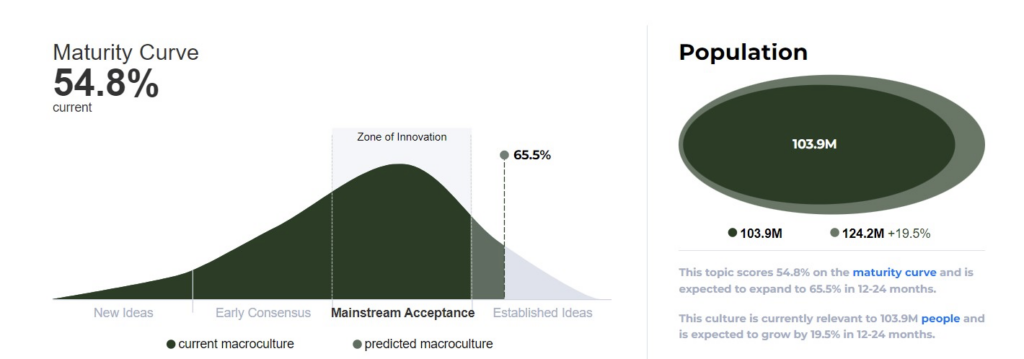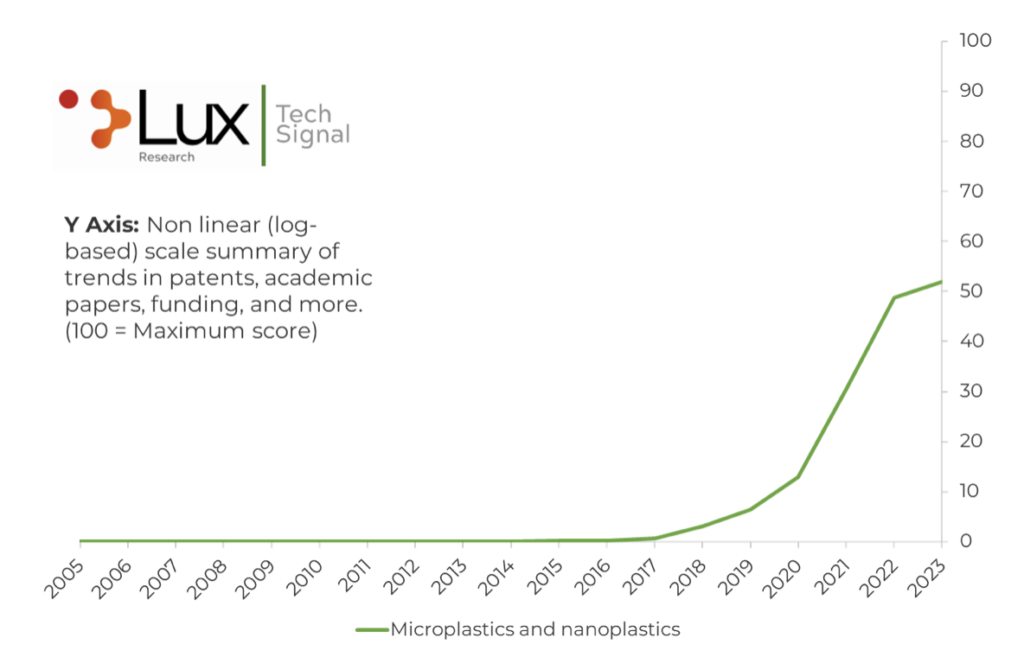Wenn Sie eine Umfrage unter den Innovationsführern der chemischen Industrie durchführen würden und fragen würden: "Was sind die größten Herausforderungen, mit denen Sie konfrontiert sind?" Ich bin mir ziemlich sicher, dass die Themen Nummer eins und Nummer zwei die Dekarbonisierung und das Recycling wären (den Führungskräften diese Frage zu stellen, ist ein wichtiger Teil meiner Arbeit, glauben Sie mir). Ich kann diese Antworten gut nachvollziehen: Die Dekarbonisierung steht in direktem Zusammenhang mit der Abwendung der schlimmsten Folgen des Klimawandels, und Plastikmüll ist für viele Verbraucher zu einem sehr sichtbaren Problem geworden, das nun echte regulatorische Konsequenzen für die chemische Industrie nach sich zieht. Ich glaube nicht, dass viele Menschen Mikroplastik an die Spitze dieser Liste setzen würden, und zwar aus einer Reihe von vernünftigen Gründen: Zum einen gibt es keinen Konsens darüber, wie schädlich sie sind. Ich bin jedoch zunehmend davon überzeugt, dass die Verschmutzung durch Mikroplastik in naher Zukunft eine größere Bedrohung für die chemische Industrie darstellt als die Kohlenstoffemissionen, und möglicherweise ist sie sogar ein größeres Problem als das Recycling. Sehen Sie sich die nachstehende Reifekurve an:

Unser MotivAI-Tool versucht, den Grad der Übereinstimmung unter den Verbrauchern (in diesem Fall den amerikanischen Verbrauchern) zu messen. Wie Sie sehen können, gibt es ein recht hohes Maß an Übereinstimmung über die Bedeutung von Mikroplastik, und diese Bedeutung wird sich in den nächsten 12 bis 24 Monaten als etabliertes Konzept vollständig durchsetzen. Die Bedeutung, die sich durchsetzen wird, ist, dass Mikroplastik ein erhebliches und allgegenwärtiges Gesundheitsrisiko darstellt, sowohl für die menschliche Gesundheit als auch für die Umwelt im weiteren Sinne. Dies ist insofern von Bedeutung, als die Verbraucher sowohl den politischen Entscheidungsträgern als auch den Chemieunternehmen weit voraus sind, was bei Themen wie recyceltem Kunststoff oder Dekarbonisierung, die bei den Verbrauchern relativ wenig Beachtung finden, nicht der Fall ist.
Die chemische Industrie reagiert auf diese Art von Problemen im Allgemeinen eher reaktiv - in Bereichen wie Per- und Polyfluoralkylsubstanzen (PFAS, die ein ähnliches Problem der Wasserverschmutzung darstellen) wurden größere Maßnahmen meist auf Betreiben von Regulierungsbehörden oder nach wichtigen Gerichtsverfahren ergriffen. Die Bemühungen um eine Dekarbonisierung folgten auf erhebliche Erhöhungen der Kohlenstoffkosten in der EU oder auf neue Anreize in den USA. Die Bemühungen um das Recycling erfolgten, nachdem umfangreiche Maßnahmen der chinesischen Regierung den Markt gestört und weltweit eine Reaktion der Behörden ausgelöst hatten. Wenn Chemieunternehmen nach demselben Muster vorgehen, riskieren sie, dass die Verbraucher zurückschlagen: Als Vorbild sollte hier die Bisphenol-A-Kontroverse dienen, bei der eine ganze Chemikalie aus Verbraucherprodukten herausformuliert werden musste. Nicht zuletzt deshalb sind Wasserflaschen aus Metall jetzt so in Mode. Wenn die Verbraucher eine enge Verbindung zwischen Plastikverpackungen und Mikroplastik in Lebensmitteln herstellen, könnte dies eine große Welle des Umstiegs von Plastik auf Papier auslösen.
Ist die chemische Industrie bereit? Es gibt einigen Grund zur Hoffnung. Das Lux Tech Signal für Mikroplastik und Nanokunststoffe (siehe unten) zeigt, dass es eine gute Dynamik gibt. Die Technologien dürften im Zeitrahmen von 2025 bis 2027 einsatzbereit sein, also in nicht allzu weiter Ferne.

Bei näherer Betrachtung zeigt sich jedoch, dass die meiste Dynamik bei mikroplastikfreien Alternativen (biologisch abbaubare Polymere wie Polyhydroxyalkanoate) zu verzeichnen ist. Diese Alternativen haben fast die gesamte Finanzierung im Zusammenhang mit Mikroplastik erhalten. Neuartige Kunststoffe haben viele große Hürden zu überwinden - nicht zuletzt deshalb, weil biologisch abbaubare Kunststoffe das Recycling erheblich erschweren. Im Gegensatz dazu sind Technologien zur Sanierung von Mikroplastik noch wenig erforscht; außerdem sind Chemieunternehmen keine sehr aktiven Investoren in diesem Bereich. Einige Technologien, wie z. B. die Sanierung von PFAS, sollten sich auch für die Behandlung von Mikroplastik eignen, aber ich denke, dass die chemische Industrie dieses Risiko noch nicht ernst genug nimmt. Das schlimmste Szenario ist, dass ein Rückschlag bei Mikroplastik nicht nur die chemische Industrie beeinträchtigt, sondern auch andere nachhaltige Initiativen wie Recycling zum Scheitern bringt . Die Strategie der chemischen Industrie war es, auf die Politik zu reagieren. Die Politik wird zwar kommen (siehe die anstehenden EU-Gesetze oder die hochrangige Politik der Vereinten Nationen), aber es reicht nicht aus, proaktiv auf die Politik zu reagieren; die Unternehmen müssen auch proaktiv auf die Stimmung der Verbraucher reagieren, indem sie die schlimmsten Quellen von Mikroplastik identifizieren und ausformulieren und sich direkt an den Bemühungen zur Beseitigung von Mikroplastik und an der Technologie beteiligen, bevor die Gegenreaktion wirklich beginnt.
